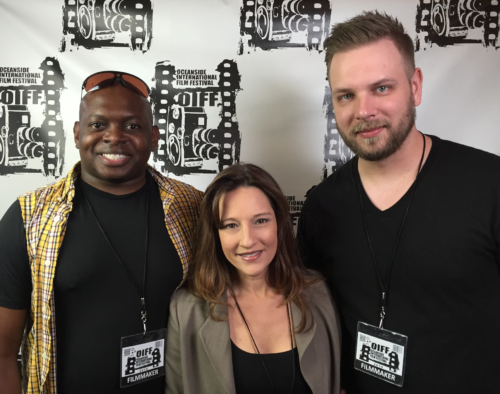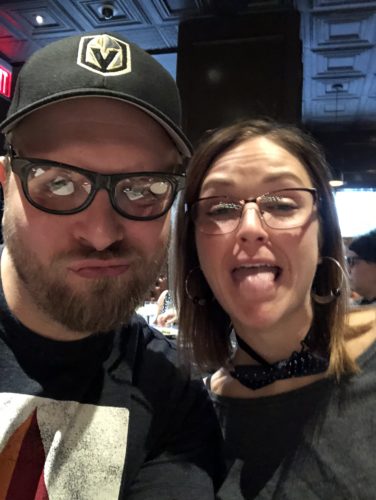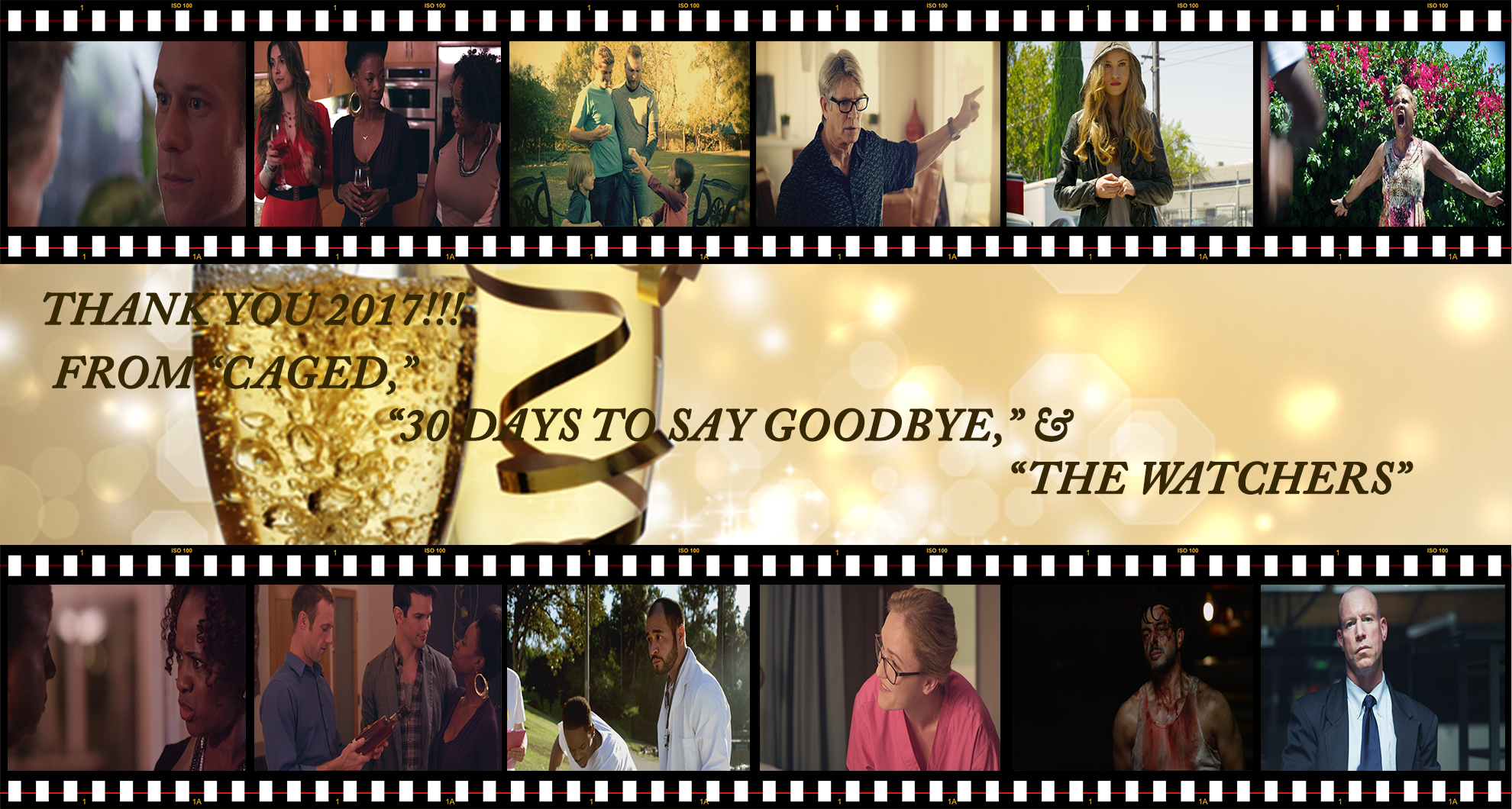SSP Staff Writer, Entertainment Zone : August 13, 2018
Today, we had the pleasure of chatting with Matthew Woodward. Standing 6’3″, wearing an “I love Boston” t-shirt and a Red Sox cap, Matthew is not your typical image of a writer. He sort of struck me as a guy who would have been working on a career in major league baseball as opposed to writing. But just goes to show that once again you should never judge a book by its cover. As we started the interview, the charismatic writer jokingly told several stories about his new life in Vegas, where he lives with his wife , dog and cat. We knew from the start that we were in for a treat.
SSP: Tell us a little about yourself.
MW: Well, I’m from Massachusetts originally. I moved out to Los Angeles in 2007 to pursue my dream of working in the entertainment business. I am currently living in Las Vegas with my wife working on new film and television projects.
SSP: Why did you want to become a screenwriter?
MW: I just really love telling stories. I would watch movies as a kid and be taken to that imaginary world. I’d get lost in the stories of Steven Spielberg, George Lucas and Stanley Kubrick, which enabled my imagination to soar and create worlds and stories of my own.
SSP: What prompted you to write “30 Days to Say Goodbye”?
MW: I was living in LA at the time and not working. I was having horrible luck finding an agent and there was a writers strike happening that shut down Hollywood. I had talked to a couple of my friends at that time and they were all creating projects of their own and they suggested that I work on a idea I had been throwing around. A few weeks later I had the first draft done and started looking to film it then. It was originally meant to be a two-part YouTube series and wasn’t an LGBTQ film.
SSP: Who inspires you in your writing?
MW: Everyday people inspire me. The people you meet at the grocery store or a gas station. People that have a story to tell but might never be heard. There is so much joy and pain people carry with them at all times and that truly inspires me. If you truly look at someone there’s a whole world of stories in their eyes waiting to be told.

Matthew enjoying some oysters in his home town.
SSP: Are these inspirations reflected in “30 Days to say Goodbye”?
MW: Yes. Like I said 30 Days wasn’t originally an LGBTQ film. It wasn’t until I had met so many men and women that didn’t have the same rights as I did that I decided to change the story. At the time people were still fighting for marriage equality and to be treated fairly. That broke my heart — not only hearing stories of families being torn apart, but seeing first-hand as friends were told their love was not recognized by our government. It was these people who inspired me to change the story to an LGBTQ story because I truly felt it needed to be told.
SSP: Do you prefer writing short or long pieces?
MW: I prefer long pieces. I loved 30 Days but as we were filming I felt there was so much more story I could have told. If I had made the film into a feature it would have had much more lighter moments with the family. To show the world that an LGBTQ family is no different from your own family.
SSP: What defines a good story?
MW: The characters. You could have the most complex story ever written and it wouldn’t matter if your characters were crap. You have to care about them before you can care about what they’re doing.
SSP: What were the challenges you faced in writing “30 Days to Say Goodbye” given that you were a straight man?
MW: My challenges were getting the facts right and not just what I perceived that the LGBTQ community was going through. The last thing I wanted to do was make a tone-deaf film that was written by someone who had never experienced that struggle.
SSP: What type of screenplays do you prefer to write?
MW: While I love writing all types of screenplays I’ve found I really love writing drama. I find myself leaning towards stories people can relate to.
SSP: So how do you know a story you want to turn into a screenplay or TV series can carry an entire movie or TV show?
MW: For me it’s just whether I’d watch it or not. I find when I start writing my mind goes crazy with ideas and that excites me. Where could this go? Who’s pulling the strings? And so on.… If my mind doesn’t do that, then I’m pretty sure the story is not going to go far.
SSP: The story world someone creates in their screenplay can be as big as a universe, or as small as an apartment. What factors determine what the size your story world should be?
MW: Again it’s really about the characters. What’s the back story of the lead? Is it interesting enough to expand upon? I always build the world around the characters I create.
SSP: Was it harder to get started or to keep going when writing “30 Days to Say Goodbye”? What was the particular thing that you had to conquer to do either?
MW: It was harder to keep going because I wanted to get it right. I second-guessed myself a lot when writing that film. In the end, I had to trust that I created something that was true to itself.
SSP: Do the conventions of the key genres in Hollywood hamper you as a writer?
MW: Not really. I don’t really have an explanation for this. It just is what it is.
SSP: If you could change one thing about yourself, what would it be?
MW: I’d tell my younger self not to get all the tattoos. (Laughs)
SSP: How would you describe yourself professionally in five words?
MW: Reliable, Honest, Imaginative, Handsome (Laughs) and Hard Working (I know that’s 2 words).
SSP: What previous experience do you have as a screen writer or in another writing career?
MW: I had written small short films here and there prior to 30 Days but that was my first finished screenplay. Since, I’ve written a few feature films and I’m currently working on a TV series.
SSP: How do you work to improve your writing on a daily basis?
MW: Really it’s just being able to go back through your work and be honest with yourself. If you wrote crap, scratch it and start anew.
SSP: How do you continue a flow of creativity day by day?
MW: It’s not always easy. There are days that I just can’t think of anything new or anything to add to a story I’m writing. When that happens, I go out to a casino or a bar and meet people. Talk about sports over a beer. You’d be amazed how much that helps.
SSP: What kinds of skills do you have that make you a good screenwriter?
MW: For me, I’d say I’m really good at dialog. I tend to write dialog that flows and feels natural. I hate when I watch a show or film and it feels like the actor is struggling to get through his lines. That’s not the actors fault, it’s the writers.
SSP: What is your favorite genre of writing?
MW: I haven’t written them all yet so I can’t answer honestly. That being said I’m really loving the show I’m writing now. It’s drama mixed with some really dark comedy.
SSP: How did you know you wanted to become a screenwriter?
MW: I just love entertaining people. I love telling stories that can take people out of their everyday lives if only for a moment.
SSP: What is your favorite project you have ever worked on?
MW: Is this a trick question? (Laughs) No, honestly it was 30 Days. We shot that in 4 days, 16 hours a day. I was the lead in every scene (I’ll never do that again) and I started falling asleep on set a lot. The first day of filming was hell for everyone but days 2-4 were amazing. I feel everyone clicked on set and we all became a family. Plus I got to work with Eric Roberts so that was pretty awesome as well.
SSP: In what ways do you set yourself apart from others as a screenwriter?
MW: I don’t know yet to be honest. I think I can answer that after we film our next feature.
SSP: How do you deal with criticism about your writing?
MW: I crack people over the head! No (Laughs) I handle it pretty well. I always want to put out the best product I can so hearing criticism helps me do that. Sometimes you can’t see something because you’re too close to it and it takes an extra pair of eyes to help.
SSP: Now, you not only wrote “30 Days to Say Goodbye,” you also acted in it. What were the challenges involved given that the words on the page were your own?
MW: Oh for me that was easy. Writing for yourself is the best! I know what sounds weird coming out of my mouth. It’s nice to be able to have it be your own words.
SSP: Tell us about working with Cinematic Artistry and Silver Shadow Pictures.
MW: We had a blast! Christina from Cinematic Artistry is a sweetheart and a truly amazing producer. What can I say about Silver Shadow Pictures? Well Ed did an amazing job directing 30 days. He was also the one that got the film off the ground. It wouldn’t have been made without Ed. They both have an eye for details as well and helped mold my story into a great film… winning how many awards? 12+ I believe.

Matthew attending the Oceanside Int Film Festival, with Christina Jo’Leigh and Edward King III
SSP: Do you prefer to work at home or in the office when writing?
MW: Well at the moment, my home is my office but I do find it easier to write when I’m home.
SSP: Approximately how many drafts did you write of “30 Days to Say Goodbye”? Is that many drafts part of your standard process?
MW: I believe it was about 4 or 5 drafts. Normally I don’t write that many drafts, 2 to 3 is standard for me.
SSP: When do you know you have completed the story you are trying tell, and what is your process of getting it there?
MW: When the characters have nothing left to say. I just let it flow until it stops. Once it stops, I’ll go back and see if scenes need to be added in or not. Does that sound weird? I think it sounds weird but that’s how I do it.
SSP: Is being a writer in Hollywood the easiest job in the filmmaking process? Why or why not?
MW: I wouldn’t say it’s the easiest job at all. In fact I’d say it’s one of (key words “one of”) the hardest jobs. There’s so much content out now and writers are tasked with creating worlds and characters people want to be part of.
SSP: How long does it take you to write a first draft?
MW: Oh that differs all the time. I could write a feature film in 3 days if I’m on a roll. It could also take 3 weeks or even months. Just depends on how well the story is flowing through me on the days I’m writing.
SSP: Does the type of injustice portrayed in “30 Days to Say Goodbye” happen often?
MW: Yes and more often than you’d think. There is still a long way to go for true equality.
SSP: What’s the best advice you can give writers to help them to develop their own unique voice and style?
MW: Trust yourself and don’t be afraid to fail. You’ll never find your voice or style if you’re too afraid to look for it. Don’t care what people might think, just write and create your own world.
SSP: When a writer has an idea for a screenplay, what questions should they be asking themselves before writing?
MW: Has this story been told and if so is my story better or different?
SSP: Back to basics: Does character come from plot, or plot from character?
MW: For me, it’s plot from character most of the time. Every now and again a character will pop up from a plot idea.
SSP: Writing good, crisp dialogue is one of the toughest things to do. How do you give each of your characters an original voice when they speak?
MW: I think I touched on this a little earlier. I tend to look into their backstory, where they came from and what they’ve been though and go from there. Even the smallest characters in a show or movie will most likely have an elaborate backstory the writer has given them.
 Matthew and wife, Kayla having a little fun at the Downtown Grand, Las Vegas.
Matthew and wife, Kayla having a little fun at the Downtown Grand, Las Vegas.
SSP: There seems to be a lot of “re-booting” in Hollywood these days. In 2019, we will see redos of “The Addams Family,” “Hellboy,” “Dumbo,” and more. What’s the best advice you can give a writer trying to push an original idea in the midst of redo, reboot or re-visual landscape of today’s Hollywood?
MW: Just make sure it’s something people would want to see. I feel the reason we’re getting so many reboots is because of the lack of good original ideas. Now I’m not saying there are no good original programming or movies coming out, because there is. It’s just that people are getting bored with what Hollywood is shoving down their throats, so they tend to turn back to the classics… even if the classic is a reboot. Also that being said, I’ve always had the dream of remaking “Killer Clowns from Outer Space.”
SSP: What are common myths about being a successful screenwriter in Hollywood?
MW: I’ll be able to answers that when I’m more successful. (Laughs)
SSP: Could you name three non-screenwriting sources that you used to sharpen your craft that might help our readers?
MW: Again, getting out and talking to people and seeing the world firsthand. I tend to watch a lot of movies that help inspire me. Also reading books or short stories.
SSP: What would you say is the biggest misconception about learning and understanding story structure?
MW: That the age old boy meets girl, boy loses girl, boy gets girl back structure is perfect. There is a certain story structure that Hollywood stands by and it makes them a lot of money and it’s also the reason that “Save the Cat” is the book every screenwriter reads. I think it’s a misconception that writers need to follow that structure to have a good script. It’s 2018 and the programming we have now is endless, I say mix it up a little and see what happens. I don’t know if I answered your question correctly but my eye is twitching now because of my answer. (Laughs)
SSP: How do you want others to see you as a professional? Explain.
MW: As exactly that, professional. I want to create and help others do the same in a safe environment.
SSP: What do you want to be when you grow up?
MW: Well I’m 36, so I’ll say 40 is grown up… and I want to be successful.
SSP: If someone was going to make your life into a movie, who would play you?
MW: Dax Shepard.
SSP: Finally, if you had a magic wand, what wish would you grant yourself and why?
MW: Well I do have a magic wand from Harry Potter’s Wizarding World. The wish I would grant myself is the ability to make movies and shows. I don’t care about fame; I just want to work. I want to make something people can enjoy and escape life, if only for a second. So yes, my wish would be for steady work.
SSP: Thank you Matthew! We can’t wait to see what you have in-store for us next!
WATCH “30 Days to Say Goodbye” on AMAZON or AMAZON PRIME TODAY!!
Follow us on Facebook!



